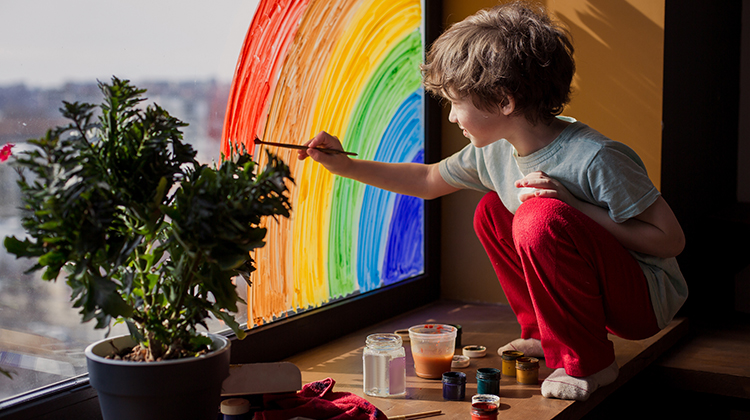Beyond the worksheet: creativity and resilience in online learning

Let’s be real. The ‘new normal’ of online learning from home is stressful for parents juggling work and supervision, intimidating for teachers forced to pivot in a miniscule time frame, and destabilising for students as they adjust to this hybrid environment. There will be moments that will be agonising, from tech issues to disengagement to loneliness. The value of embodied, face-to-face learning is starkly visible.
But as we accept our reality for the time being, there are opportunities to be found if we can take up the challenge to adapt and innovate, rather than resist and cope. In fact, creatives will tell you that new ideas are born when you are given unusual restrictions.
It leads us to the question of what the purpose of education is in the 21st century. And whilst the ‘bread and butter’ foundational skills of literacy and numeracy are essential, research shows that our rapidly changing economy demands higher level capacities like critical and creative problem solving, innovation, self-motivation, adaptability and cross-cultural collaboration.
And there has been no greater moment to test humanity in this department than the global pandemic. Schools have the potential to go beyond standardised worksheets and fixed online programmes. We can draw on our current circumstances to develop meaningful learning activities that open up avenues for complex, situated thinking.
Rich tasks could be adapted for different year levels and the availability of resources at home. Draw a map of your house to scale. Design and build a Rube Goldberg machine. Make a miniature city, considering the interrelated elements of infrastructure, natural resources and waste management. Invent something. Grow your own garden, tracking inputs like compost, water and sun. Cook dinner for your family, researching recipes from different cultures, investigating where your food comes from and documenting the budget. Research five things that interest you and present as a personal project. Run your own Zoom class on a topic you are passionate about. Develop a positive initiative in your community, like making a swap table, art installation, learning to sew masks or delivering groceries to the elderly. Discuss mental health issues and strategies and make a poster to help. Write detailed, old-fashioned letters, proofread by your teacher, to your friends and family. Connect with students in lockdown around the world and share experiences. Research the 1918 Flu Pandemic, and compare the world response to COVID-19. Analyse different news stories and compare their representations. Make your own poetry, music, film, meme, blog, news story or talk show. Write about what matters to you.
These kinds of tasks allow students to develop agency and make sense of the world they find themselves in. They are an antidote to the passive, teacher-led, prescriptive instruction that can leave students feeling daunted, even in a live classroom. We cannot expect young people to stare at a screen all day regurgitating information, or we will see negative effects on health, wellbeing and motivation. Children need to move, to play, to be immersed in their surroundings. We need to find activities that tap into their natural interests and present ways to think critically, make connections between concepts, apply knowledge in a real context, and be active, global, compassionate citizens.
Lockdown brings hidden gifts. Being isolated across different households means there is room for differentiation and individual exploration. Sophisticated technological skills will organically evolve out of need, rather than a disembodied e-learning curriculum. Teachers can find flexible ways of scaffolding and assessing projects that cross disciplines instead of relying on direct, compartmentalised instruction.
If, as teachers and parents, we can facilitate this kind of authentic learning, we better equip young people to survive and thrive in an uncertain future. It requires us to be brave by giving space and faith to our children to find their own passions and initiative. As we are all learning, sometimes imagination grows out of boredom and purpose grows out of feeling lost.
Whether scientists or nurses or politicians or citizens, this crisis has thrown established forms up in the air. It demands us to radically redefine our approach, experiment and reform. It calls upon the very skills that education must aspire to teach. More than anything, young people absorb our collective attitudes. So as we go through the eye of the needle of this enormous global challenge towards an open horizon, modelling resilience, innovation and agility will be our greatest gift to them.
References
Trilling, B., & Fadel, C. (2009). 21st century skills: Learning for life in our times. Jossey-Bass.